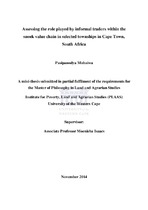| dc.contributor.advisor | Isaacs, Moenieba | |
| dc.contributor.author | Mubaiwa, Pasipanodya | |
| dc.date.accessioned | 2015-05-27T15:06:27Z | |
| dc.date.available | 2015-05-27T15:06:27Z | |
| dc.date.issued | 2014 | |
| dc.identifier.uri | http://hdl.handle.net/11394/4219 | |
| dc.description | Magister Philosophiae (Land and Agrarian Studies) - MPhil(LAS) | en_US |
| dc.description.abstract | In the Western Cape, snoek (Thyrsites atun) is a target for small scale fisheries. This fishery is comprised of recreational, subsistence and traditional line fisheries in the province. Snoek contributes 40% to 50% of the line fish which is landed. This thesis sought to identify the roles which are performed by informal snoek traders in certain Cape Town coloured1 townships in the snoek value chain. There are various aspects of this fish which heightens its importance in the Western Cape. Snoek is significant in the provision of food security for many poor and working class individuals and households within the coloured townships of Cape Town. Snoek is an omega 3-rich fish and is one of the Cape’s most well-known gastronomic traditions. It provides affordable and easily absorbable proteins, vitamins and minerals for township people. Poor people mostly rely on starches and fail to afford the most expensive protein sources like red meat. The snoek trade also helps in the creation of jobs and enables people to earn cash income. The study revealed that there is specialisation and division of labour between snoek traders and fishers. Snoek is sold via the auction system at the various landing zones scattered all over the Western Cape. It was observed that the snoek value chain is dominated by men and there are few women in the value chain who sell or clean snoek. Informal snoek traders ply their business next to shops or on the sides of busy roads using ‘bakkies’2 from where the fish is flayed and sold to
the waiting customer to emphasise its freshness. Snoek traders create convenience by bringing fresh fish to customers in the townships. They also assume risks which come with venturing in business. Some snoek traders engage in multiple livelihood strategies by diversifying income generating activities rather than relying on one income source. Among the several challenges which snoek traders confront, one pressing challenge they need to address is their lack of organisation which prohibits them from speaking with one voice. The snoek value chain should be more efficient so that it keeps supplying the much needed nutrients in the townships. Both
primary and secondary data collection techniques were used. Snoek traders face a myriad of challenges which require the authorities to address. They have no access to infrastructure with sanitary facilities. The other problem they face is that they are disorganised amongst themselves which weaken their cause. Traders and fishers would like to see the real transformation taking place within this snoek fishery. Traders are convinced that there is corruption within the fisheries
department and many have lost faith in the system. | en_US |
| dc.language.iso | en | en_US |
| dc.publisher | University of the Western Cape | en_US |
| dc.subject | Snoek | en_US |
| dc.subject | Informal traders | en_US |
| dc.subject | Small scale fisheries | en_US |
| dc.subject | Gender | en_US |
| dc.subject | Cape Town | en_US |
| dc.title | Assessing the role played by informal traders within the snoek value chain in selected townships in Cape Town, South Africa | en_US |
| dc.rights.holder | University of the Western Cape | en_US |

